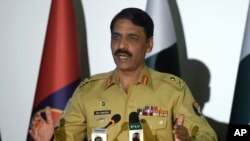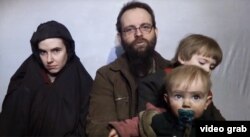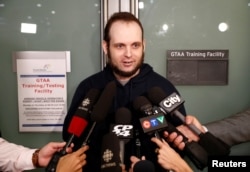Pakistan and the United States, uneasy allies in the war against terrorism, appear upbeat about better cooperation and relations after a joint effort freed a U.S.-Canadian family from Taliban captivity.
Pakistani security forces, acting on a tip from U.S. intelligence, rescued American Caitlan Coleman; her Canadian husband, Joshua Boyle; and their three young children Wednesday, hours after kidnappers had transported them into Pakistan across the porous Afghan border.
The family has since been repatriated to Canada, after enduring five years as captives of the Taliban-linked Haqqani network in Afghanistan, which allegedly is tied to the Pakistani spy agency, ISI.
Coleman and Boyle disappeared while backpacking in Afghanistan in 2012. The Afghan Taliban later claimed responsibility for kidnapping them.
"Starting to develop a much better relationship with Pakistan and its leaders. I want to thank them for their cooperation on many fronts," U.S. President Donald Trump tweeted Friday.
'A good beginning'
Pakistan's military spokesman, Major General Asif Ghafoor, while releasing fresh details of the rescue operation, said at a news conference Saturday that the incident offered a good opening in restoring mutual trust.
"We feel happy that there is a level of trust and confidence, which the U.S. leadership has shown in Pakistan and Pakistan's security forces … so we take it as a good beginning," Ghafoor said.
The general went on to vow that if the "trust-based" relationship was carried forward and "you [U.S.] work with us, cooperate with us, trust us, we will take all actions which are in the interest of Pakistan" and in the interest of regional peace and counterterrorism efforts.
Ghafoor explained while discussing details of the rescue operation that the safety of the hostages was the top priority for Pakistani forces. The army spokesman added that the driver and three armed men escorting the hostages in a separate car fled into a nearby Afghan refugee camp as soon as security forces surrounded them and shot out the tires of their vehicles.
Ghafoor also released a video message that Boyle recorded just before the family flew out of Pakistan, in which the Canadian man praised the rescue operation as "incredibly professional."
"So, I can say to you I did see the truth, and the truth was that [the] car was riddled with bullets. The ISI [Pakistani spy agency) and the army got between the criminals and the car to make sure that the prisoners were safe and my family was safe," said Boyle.
Staging of event denied
The army released Boyle's message in a bid to dismiss as "propaganda" reports that the rescue operation was staged and the release of the family was an outcome of secret negotiations with militants.
Coleman was pregnant at the time of the couple's kidnapping. She gave birth to four children while in captivity.
In a statement at the Toronto airport, Boyle said members of the Haqqani network had killed one of the family's children, an infant girl, and had raped his wife during the time they were held hostage.
While the hostage rescue has raised hopes of improved ties between Islamabad and Washington, analysts are skeptical about whether a single incident would bridge the trust deficit and ease long-running suspicions plaguing bilateral ties.
Tom Bossert, White House homeland security adviser, on Friday underscored challenges facing bilateral ties.
Hope of a trend
"We thank the Pakistani government and recognize this was a positive step. One action, though, does not constitute a reversal of a trend of unfortunate behaviors. However, we are hopeful that it portends that trend," said Bossert.
U.S. officials think sanctuaries on Pakistani soil have enabled the Taliban to sustain and expand insurgent activities in Afghanistan, and they want Islamabad to do more to undo those safe havens.
Army spokesman Ghafoor again dismissed those assertions on Saturday and said Pakistan had cleared its territory of all terrorist groups, leaving "no room for us to do more."


